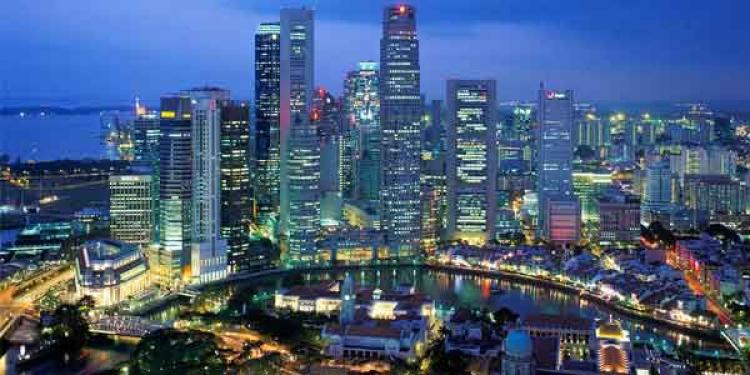Casinos May be Booming, but Sports Betting in Singapore has a Ways to Go
Posted: March 21, 2014
Updated: October 4, 2017

Singapore is now the world’s #3 casino gambling center, but restrictions on sports betting push locals to look elsewhere to place wagers.
The South China Sea city-state of Singapore has been a big gambling success over the past decade, becoming the third-largest city by gambling revenue worldwide, behind only Macau and Las Vegas according to a report by the Las Vegas Review-Journal. It has only two licensed casinos, the Genting Resorts World Sentosa and the Marina Bay Sands (owned by Vegas big-wig Sheldon Adelson), but both are huge draws for international gamblers. While these swanky casinos have done excellent business catering to wealthy bankers and foreign travelers, its sports betting market leaves a lot to be desired.
Despite its burgeoning casino industry (which was created in 2006), Singaporean gambling laws are fairly restrictive. Private bookmakers are not allowed to operate, and the government is not afraid to go after people who run afoul of the law. According to official police statistics 1,566 people were arrested in 2008 on illegal gambling charges. However, as far as we know no one has been arrested or charged with a crime for using foreign-operated betting sites.
Laws for sports betting in Singapore
• Singapore first legalized casinos in 2006 and issued only two licenses, to the Genting Resorts World Sentosa and the Marina Bay Sands
• Currently Singapore has only two legal sports betting providers, Singapore Pools and Turf Club, which specializes in Horse Racing
• Foreign-licensed online bookies like Bet365, Ladbrokes and DafaBet are very popular, although the government has recently discussed blocking them
Due to the Betting Act and Common Games House Act, which were originally passed in 1960 but have been updated several times, the only legal way to wager on sports in Singapore is through a state-run betting operation called Singapore Pools, and a horse track called The Turf Club. The official bookmaker allows users to bet on football matches as well as motor racing, offering live betting and available in-person, online and via mobile devices. The Turf Club allows bettors to place wagers on domestic and international horseracing events also in-person or via electronic device.
Private bookmakers are not allowed to offer sports betting in Singapore, limiting the options available to bettors. The lack of competition allows Singapore Pools and the Turf Club to offer less bettor-friendly odds than they otherwise would. This had led many in the country to seek other options, regardless of questionable legality.
Where the money is going
The government legalized casinos in 2006 as a way to bring tourists into the country and expand both business and tax revue. Ironically, it has taken the opposite approach with regards to sports betting, keeping the industry restricted and in effect throwing bookmaker revenue and tax dollars out of the country. While the government does not license any private bookmakers, it does not prevent citizens from accessing foreign-operated betting sites.
For that reason, many local bettors simply log on and place wagers wherever they see fit. According to our figures, at least eighteen international bookmakers serve Singaporean punters, including some big names including Bet365, Ladbrokes, Paddy Power, BetVictor and online sportsbooks in the Philippines Dafabet. Of these, BetVictor, Bet365, Ladbrokes, Dafabet and several others accept wagers in Singaporean Dollars as well as US greenbacks. BetVictor, Bet365 and Ladbrokes also offer services and customer support in both Chinese and English.
Given that the international betting industry has rolled out the red carpet for Singaporean punters, one can see that the market size is not insignificant. A survey by the Home Affairs Ministry found that 30 percent of citizens gambled or bet online in 2013. In order to stop the flow of betting dollars out of the country and into the pockets of bookies in London and Gibraltar, the authorities either need to license domestic bookmakers or take measures to prevent locals from accessing foreign sites.
Government to tighten the screws?
2013 brought indicators that the government would choose to prohibit rather than regulate online betting. Last November Home Secretary S. Isawaran expressed the desire to send “a clear signal” that the authorities would no longer tolerate locals accessing foreign casino and betting sites, stating that they “can potentially become a source or conduit of funds for other illegal activities and syndicated crime.” While those concerns are legitimate in some cases, most Singaporeans use reputable foreign sites, so money laundering is not a problem.
Ramping-up restrictions could include blocking the IP addresses of foreign bookies, penalizing banks which process betting and gambling transactions, as well as banning online gambling advertising. We don’t think that this is the best way to deal with the issue, but it looks to be that path that the authorities will take. As of now no such laws have been passed, but we expect them to in the near future.
In addition to increasing restrictions, the government is flirting with the idea of opening a state-owned online casino operated by Singapore Pools to keep some online gambling dollars in the country. Singapore Pools currently only offers lottery and football and motor racing betting, but last December expressed the desire to expand to provide some casino gambling offers as well.












